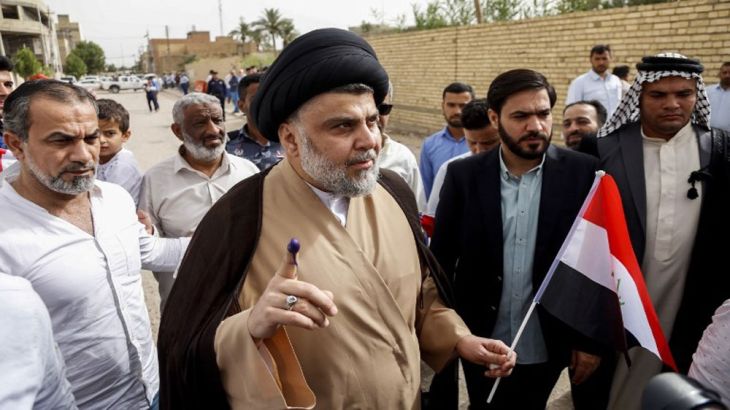Iraq elections final results: Sadr’s bloc wins parliamentary poll
Shia leader cannot become PM as he did not run in the polls, but the victory puts him in a good negotiating position.

A political bloc led by Shia leader Muqtada al-Sadr has won the country’s parliamentary election, the electoral commission said, ahead of internationally favoured Prime Minister Haider al-Abadi‘s bloc.
Al-Sadr himself cannot become prime minister as he did not run in the election, but his bloc’s victory puts him in a position to have a strong say in negotiations.
Keep reading
list of 4 itemsSolomon Islanders vote in election that could shape ties with China
Analysis: Ruling party errors give Turkey’s opposition hope for future
Behind India’s Manipur conflict: A tale of drugs, armed groups and politics
His electoral list captured 54 parliamentary seats, according to the results released on Saturday.
The Fatah bloc led by Hadi al-Amiri, who has close ties with Iran, came in second with 47 seats.
The Nasr Coalition, headed by incumbent al-Abadi, took third place with 42.
Al-Sadr, who made his name leading two violent uprisings against US occupation troops, was sidelined for years by Iranian-backed rivals.
His bloc’s performance represented a rebuke to a political elite that some voters blame for widespread corruption and dysfunctional governance.
Al-Sadr‘s alliance – an unconventional one with communists and secular Iraqis – has announced it is fiercely opposed to any foreign interference in Iraq – whether Tehran’s or Washington’s.
It has promised to help the poor and build schools and hospitals in Iraq, which was battered in the war to defeat the Islamic State of Iraq and the Levant (ISIL, also known as ISIS) and has suffered economically as a result of low oil prices.
Before the election, Iran publicly stated it would not allow al-Sadr‘s bloc to govern.
In a tweet shortly after results were announced, al-Sadr said: “Reform is victorious and corruption is diminishing.”
Talks to form government
Winning the largest number of seats does not automatically guarantee that al-Sadr will be able to hand-pick a prime minister. The other winning blocs would have to agree on the nomination.
In a 2010 election, Vice President Iyad Allawi’s group won the largest number of seats, albeit with a narrow margin, but he was blocked from becoming premier, which he blamed on Tehran.
The election dealt a blow to al-Abadi, but he could still emerge as a compromise candidate palatable to all sides because he has skillfully managed the competing interests of the US and Iran – unwitting allies in the war against ISIL – during his term in office.
Al-Amiri is regarded as one of the most powerful figures in Iraq, having spent two decades fighting against Saddam Hussein from his exile in Iran.
Iranian Major General Qassem Soleimani, commander of foreign operations for Iran’s elite Revolutionary Guards and a highly influential figure in Iraq, has been holding talks with politicians in Baghdad to promote the formation of a new cabinet that would have Iran’s approval.
Negotiations are expected to drag on for months.
The government should be formed within 90 days of the official results.